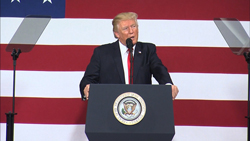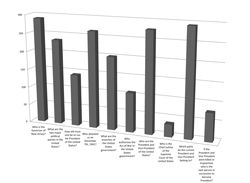The University hosted John Dean, the White House Counsel during the Watergate scandal, and James D. Robenalt, Esq., a presidential historian and attorney, for a discussion comparing Presidents Richard Nixon and Donald Trump, on Monday, Oct. 29.
The discussion was held in Wilson Hall Auditorium as part of the H.R. Young and Stephen B. Siegel Endowed Lecture Series. An estimated 225 alumni, community members, students, and professors were registered for attendance.
Peter Reinhart, Esq., Director of the Real Estate Institute, is responsible for bringing these two men to campus. “This event is a follow up event from December 2015 when John Dean and Jim Robenalt first spoke on campus,” Reinhart said. “I had met them in summer 2015 when I attended their Continuing Legal Education program. I was so fascinated by their presentation that I invited them to come to Monmouth.”
“Their appearance is important to the Monmouth community for several reasons,” continued Reinhart. “First, is the appearance of a living historical figure discussing very significant historic events in which he was a central figure. Second, the timing of the event is important given the fact that the midterm Congressional elections are just eight days away.”
In their discussion, Dean and Robenalt compared leadership styles of Trump and Nixon. Dean found their leadership styles to be “strikingly authoritarian” and considers them to be “social dominators.” In U.S. history, he believes there have been four of these Commanders-in-Chief: Andrew Jackson, Woodrow Wilson, Richard Nixon, and Donald Trump. He explained these leaders, “oppose equality, have intimidating/bullying personalities, amoral, and crave personal power.”
Another comparison the two noted is both Nixon’s and Trump’s attack on the media. Nixon famously said, “Never forget the press is the enemy. The establishment is the enemy. The professors are the enemy…” Similarly, Trump has also called out various media organizations for disparaging him.
Stephen Chapman, Ph.D., an assistant professor of political science, agrees with their comparison. “I think there are some parallels in terms of Nixon’s and Trump’s approach to the presidency in that they both saw aspects of the government as ‘against’ them and had a special disdain for the media,” he said.
Robenalt and Dean also discussed the personalities of Trump and Nixon as “obsessed with enemies and critics,” “hating to lose,” and “loss-frame” minded.
Nixon was charged by the House of Representatives for obstruction of justice after refusing to release the infamous tapes, on July 27, 1974. Dean compared Nixon’s obstruction of justice to that of Trump and said, “His firing of James Comey and his behavior in the Mueller investigation is pretty shocking.”
“As counsel to the White House, I prepared a lengthy statement to the Senate Watergate Committee and at the very end of it, I said, ‘I may have been taped in one conversation with Nixon,’” said Dean. He explained that a single taping led to Alexander Butterfield, Deputy Assistant to Nixon, to confess Nixon taped everything. Dean said that he listened to over 1,000 recorded conversations with mention of the Watergate scandal.
Their discussion also included limits on presidential power. Chapman found the biggest Congressional limit against the Nixon Administration was the War Powers Act of 1973. “This was in response to the Gulf of Tonkin Resolution that gave [President Lyndon B. Johnson] the power to engage in armed conflict without Congress declaring war,” he said.
“The War Powers Act limited the presidential military powers by requiring the president to inform Congress within 48 hours of dispersing military resources, including troops. The president is also limited under the law in that the military engagement cannot last beyond 60 days without Congressional approval,” Chapman concluded.
Though several members attended the event, registration was required, which could have caused the lack of students present at the event.
Matt Kass, an Ocean Township resident and Monmouth community member, attended the event Monday night. “It was interesting going back into my memory of Watergate,” said Kass. “I’m hoping to come to more of these lectures. However, it would be good to see more students come. It’s important to hear these issues discussed. It creates a balance on thoughts and opinions.”



